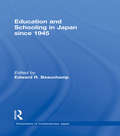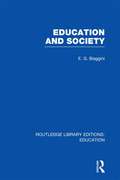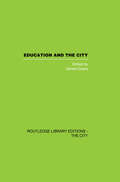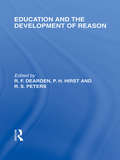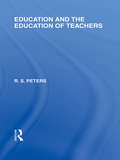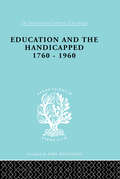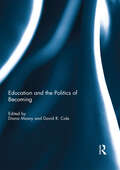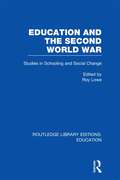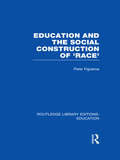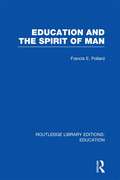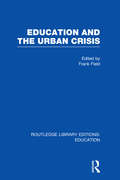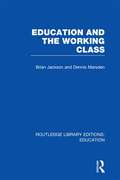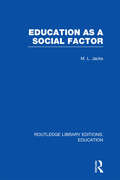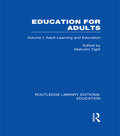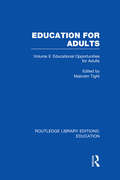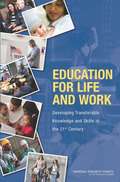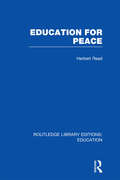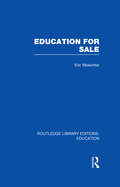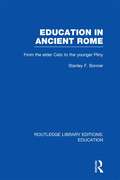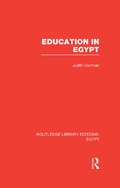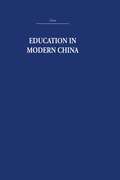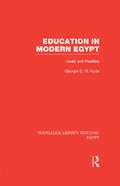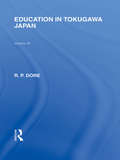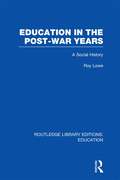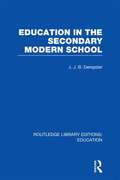- Table View
- List View
Education and Schooling in Japan since 1945 (Dimensions of Contemporary Japan #Vol. 3)
by Edward R. BeauchampFirst Published in 1999. Routledge is an imprint of Taylor & Francis, an informa company.
Education and Society (Routledge Library Editions: Education #166)
by E. G. BiagginiThis volume discusses how the lay-person responds to written appeals to his intelligence and feelings with particular emphasis on education and culture. The author indicates a possible approach to the task of investigation rather than all that can be done with the method employed. The second part deals with educational questions relevant to the evidence and examines the social implications of this evidence.
Education and the City: Theory, History and Contemporary Practice
by Gerald GraceCity schools, especially those attended by working class and ethnic minority pupils are teh catalysts of many significant issues in educational debate and policy making. They bring into sharp focus questions to do with class, gender and race relations in education; concepts of equality of opportunity and of social justice; and controversies about the wider political economic and social context of mass schooling. America, Western Europe and Australia have all taken a keen interest in the problems of urban schooling. The contributors to this collection of original essays all share a concern about these problems, although they approach them from a wide range of theoretical and ideological positions. Gerald Grace and his contributors criticis the current limitations of urban education as a field of study and they present a foundation for a more historically located and critically informed inquiry into problems, conflicts and contradictions in urban schooling. Part I presents contributions on theories of the urban. Part II focuses upon the history of urban education both in Britain and the USA. Part III discusses contemporary policy and practice with essays relating to education in inner city London and in New York City. This book was first published in 1984.
Education and the Development of Reason (International Library of the Philosophy of Education Volume 8)
by R. F. DeardenThis volume critically and constructively discusses philosophical questions which have particular bearing on the formulation of educational aims. The book is divided into three major parts: the first deals with the nature of education, and discusses the various general aims, such as 'mental health', 'socialization' and 'creativity' which have been thought to characterize it; the second section is concerned with the nature of reason and its relationship to feeling, will and action; finally the development of different aspects of reason in an educational context is considered.
Education and the Education of Teachers (International Library of the Philosophy of Education volume 18)
by R.S. PetersThis collection of important and significant papers examines a wide range of issues. One of the author's main concerns is to clarify the meaning of 'education' and 'quality in education' - a phrase often used in public debate but seldom scrutinized. Long-standing ambiguities latent in the concept of 'liberal education' are also exposed, and Herbert Spencer's question 'What knowledge is of most worth?', vital in the light of the recent vast development of knowledge, is considered. The first section of the collection clarifies different aspects of the concept of education and to reflect upon the difficulties and dilemmas facing teachers who strive to educate their pupils as distinct from just preparing them for examinations. This section concludes with a constructive re-examination of Plato's conception of education with a view to seeing what is acceptable in it instead of just concentrating on what is manifestly unacceptable. The second section is concerned with the role of edcuational theory in the education of teachers.
Education and the Handicapped 1760 - 1960 (International Library of Sociology #Vol. 221)
by D.G. PritchardFirst published in 1998. Routledge is an imprint of Taylor & Francis, an informa company.
Education and the Politics of Becoming
by Diana MasnyThis collection examines education in the light of a politics of becoming. It takes a non-hierarchical transdisciplinary approach, challenging the macropolitics of pre-established governmental and economic agendas for education. Drawing on the philosophy of Gilles Deleuze and Felix Guattari, the contributors consider questions such as how education might engage a politics of becoming, and how education and becoming function in a society of control. Since Deleuze and Guattari contend that a society is defined by its becomings, its transformations, this collection asks how education, itself a process in becoming, may contribute "collective creations" to a society in continual flux.The chapters bring theory and praxis together, deploying power, affect, cartography, space, relationality, assemblage and multiple literacies in order to experiment with music, art, language, teacher education, curriculum and policy studies. This collection is an innovative resource, creating an encounter with the macropolitics of education, and altering teaching, learning, evaluation and curriculum. This book was originally published as a special issue of Discourse: Studies in the Cultural Politics of Education.
Education and the Second World War: Studies in Schooling and Social Change (Routledge Library Editions: Education)
by Roy LoweThis was the first book which globally surveyed the impact of the Second World War on schooling. It offers fascinating comparisons of the impact of total war, both in terms of physical disruption and its effects on the ideology of schooling. By analysing the effects on the education systems of each of the participant nations the contributors throw new light on the responses made in different parts of the globe to the challenge of world-wide conflict.
Education and the Social Construction of 'Race' (Routledge Library Editions: Education)
by Peter FigueroaDoes the education system help or hinder the fight against racism? This volume provides a constructive critique of the Swan Report of 1985 and of sociological research into racial and ethnic relations. The author undertakes a searching philosophical and sociological analysis of multicultural and antiracist education. He shows how the education system itself can reinforce racist assumptions and behaviour in society, but also argues that through educational and social reconstructing it can promote constructive cross-cultural relations.
Education and the Spirit of Man (Routledge Library Editions: Education #151)
by Francis PollardThis volume was the Swarthmore Lecture for 1932, one of an annual series of lectures delivered by and for members of the Society of Friends (Quakers). The lecture discusses the place of education and moral philosophy in the world of the early twentieth century, as well as the place of religious discipline in education.
Education and the Urban Crisis (Routledge Library Editions: Education)
by Frank FieldBased on two conferences, this volume explores trends during the 1960s and 1970s in inner city areas in the United Kingdom. It describes how the inner city is losing jobs and skilled workers and, as the population falls, the number of disadvantaged people and those claiming benefits is increasing. To what extent, the book asks, does the educational system contribute to or alleviate Britain’s urban crisis? In answering this question, the contributors examine the complex interrelationships between educational, economic and social problems, and point out that one of the major weaknesses of the present educational system in Britain is that it is in no way linked to the labour market. They suggest how schools could be better linked to local employment opportunities while at the same time offering more culturally varied educational opportunities. They also analyze Britain’s urban programme and show that it in no way matches up to what is required if poverty – which is seen as the root of the urban crisis – is to be eradicated.
Education and the Working Class (Routledge Library Editions: Education #179)
by Brian Jackson Dennis MarsdenWhen first published this book had a significant influence on the campaign for comprehensive schools and it spoke to generations of working-class students who were either deterred by the class barriers erected by selective schools and elite universities, or, having broken through them to gain university entry, found themselves at sea. The authors admit at the end of the book they have raised and failed to answer many questions, and in spite of the disappearance of the majority of grammar schools, many of those questions still remain unanswered.
Education as a Social Factor (Routledge Library Editions: Education)
by Leonard M JacksThis volume presents a short survey of education at the beginning of the twentieth century. It considered the main educational agencies of that time, the home, the Church, the school and the university and the role to be played by each in preparing the citizens of the future. The author maintains that religion and education are intimately connected and therefore he discusses education in its broadest sense: preparation for being not just a citizen in the United Kingdom but in human existence as a whole.
Education for Adults: Adult Learning and Education (Routledge Library Editions: Education #I)
by Malcolm TightThe nature of adult education at individual, group and community levels is the concern of this book. Definitions and patterns of adult learning are critically assessed in both this country and abroad, and the processes involved considered in detail. Both case studies and thematic articles have been included and are selected to illustrate the breadth of the field along a number of areas: formal, non-formal and informal education; face-to-face and distance education; from basic levels of education to higher education; from highly deterministic to more ‘open’ or self-directed forms of education. It is felt that the study and practice of the education of adults can be best advanced by the adoption of such a broad view.
Education for Adults: Volume 2 Opportunities for Adult Education (Routledge Library Editions: Education)
by Malcolm TightThis book opens with a survey of the historical evolution of adult education in the UK and leads on to the study of the structure of adult learning. It discusses distance teaching opportunities such as the Open University and the National Extension College, and face-to-face teaching provision in adult education centres. It also looks at specific programmes such as the Adult Literacy Initiative in the mid-1970s, and at target groups like the adult unemployed, women and ethnic groups. Comprehensive and yet broad-ranging, this volume contains much new material that offers interesting insights into both present and future opportunities for adult education.
Education for Life and Work: Developing Transferable Knowledge and Skills in the 21st Century
by James W. PellegrinoAmericans have long recognized that investments in public education contribute to the common good, enhancing national prosperity and supporting stable families, neighborhoods, and communities. Education is even more critical today, in the face of economic, environmental, and social challenges. Today's children can meet future challenges if their schooling and informal learning activities prepare them for adult roles as citizens, employees, managers, parents, volunteers, and entrepreneurs. To achieve their full potential as adults, young people need to develop a range of skills and knowledge that facilitate mastery and application of English, mathematics, and other school subjects. At the same time, business and political leaders are increasingly asking schools to develop skills such as problem solving, critical thinking, communication, collaboration, and self-management - often referred to as "21st century skills. " Education for Life and Work: Developing Transferable Knowledge and Skills in the 21st Century describes this important set of key skills that increase deeper learning, college and career readiness, student-centered learning, and higher order thinking. These labels include both cognitive and non-cognitive skills- such as critical thinking, problem solving, collaboration, effective communication, motivation, persistence, and learning to learn. 21st century skills also include creativity, innovation, and ethics that are important to later success and may be developed in formal or informal learning environments. This report also describes how these skills relate to each other and to more traditional academic skills and content in the key disciplines of reading, mathematics, and science. Education for Life and Work: Developing Transferable Knowledge and Skills in the 21st Century summarizes the findings of the research that investigates the importance of such skills to success in education, work, and other areas of adult responsibility and that demonstrates the importance of developing these skills in K-16 education. In this report, features related to learning these skills are identified, which include teacher professional development, curriculum, assessment, after-school and out-of-school programs, and informal learning centers such as exhibits and museums.
Education for Peace (Routledge Library Editions: Education #152)
by Herbert ReadThis book deals with the everlasting problem of war and peace. In it, the author argues that mankind must be predisposed for peace by the right kind of education and he discusses how to devise methods of education which will prevent war.
Education for Sale (Routledge Library Editions: Education)
by Eric MidwinterTeachers, schools and education authorities invariably hide their considerable lights and their public relations techniques are often inadequate for broadcasting the invaluable work accomplished in schools. This book offers clear-cut and highly –practical advice for every teacher from pre-school to sixth form on how to get the educational message across to parents. Over the past decades it has become an acute professional concern for teachers to involve parents as closely as possible in the educational process. The book acknowledges that educational salesmanship must be adapted to the cultural norms of its customers and that many teachers, because of their background and training, have reservations about their role as publicists. Set out here is a logical and orderly path of action to help everyone from the most extrovert to the most diffident.
Education in Ancient Rome: From the Elder Cato to the Younger Pliny (Routledge Library Editions: Education)
by Stanley BonnerThis volume examines the development, structure and role of education from the third century B.C to the time of Trajan, a period which saw great changes in Roman society. When originally published it was the first complete review of the subject for half a century and was based on a new collection and analysis of ancient source material. The book is divided into three parts. The first provides historical background, showing the effects upon the educational system of Rome’s transition from a predominantly agricultural community to a great metropolis; it traces the development of primary, grammar and rhetoric schools, and discusses educational standards both in early Rome and under the Empire, when advanced teaching was more widely available, but often adversely affected by weakening social values and diminished parental control. The volume goes on to describe the physical conditions of teaching – accommodation, equipment, discipline, the economic position of teachers and the fee-paying system, and the part played by the State. Finally, he gives a full appraisal of the standard teaching programme, from the elementary study of the three Rs, to the theory and practice of rhetoric, in which the needs of the future advocate were constantly borne in mind.
Education in Egypt: Egypt: Education In Egypt (Routledge Library Editions: Egypt)
by Judith CochranEgyptian education is a central, social and economic force in the Middle East. For hundreds of years Al Azhar University has been the centre of Islamic thinking and education. More recently Egypt became the leader in secular education as Mohammed Ali established the first medical, veterinarian, engineering and accounting schools in the Middle East. Nasser expanded Egyptian educational leadership by providing free education for Muslem students from neighbouring countries. The extensive exportation of Egyptian educators to initiate and educate in schools and universities throughout the Arab speaking world has shaped the secular and religious leaders of those countries. This book traces the history of Egyptian education over the last hundred years and highlights the key factors which have given Egyptian education its particular quality and influence within the Arab world. First published 1986.
Education in Modern China
by R.F. PriceFirst published in 1970 this re-issues the revised edition of 1979. This book examines the part played both by tradition and by the Cultural Revolution in the educational system of twentieth century China and explores the apparent reversal of policy which took place since the death of Mao. The book discusses the writings of Mao on the nature of man, society and knowledge and his ideas on education. These are then seen in the context of history, philosophy and religion. Educational aims and policies are discussed, showing how factors such as language, geography, economics and the social structure created obstacles to reform.
Education in Modern Egypt: Ideals and Realities (Routledge Library Editions: Egypt)
by Georgie D.M. HydeThis study gives a comprehensive account of the evolution of the educational system in Modern Egypt, set against the events of the last twenty five years. From the Revolution of 1952, which saw the breakdown of the party system, seen as ‘sham democracy’, to the re-adoption of the party system in 1976, the Egyptian government has searched for an ideal system that is secular, but not irreligious, and benefitting from, but not copying, the western or eastern models. Professor Hyde has analysed the problems of the educational system, administrative, institutional, theoretical and practical, and related them to Egypt’s urgent need to modernise the state, and to improve the quality of life of her hitherto deprived masses. The deficiencies of the system are discussed with emphasis on the attempts to provide solutions, mainly within the framework of reformed institutions. Informal and private education, literacy campaigns, women’s aspirations and student welfare are all considered, as are policies and plans for the immediate and long-term solutions of Egypt’s problems. The analysis also takes into account socio-economic factors in post-Revolutionary Egypt which not only constitute instruments of change in Egyptian society but also provide the restraints which prevent the rapid translation of educational ideals into reality. First published 1978.
Education in Tokugawa Japan (Routledge Library Editions: Japan)
by Ronald DoreJapanese cultural life had reached a low ebb at the beginning of the Tokugawa period. The Japanese society which emerged when Tokugawa Ieyasu had completed the process of pacifying warring baronies was neither literary, nor hardly literate. The rulers were warriors and the people they ruled were largely illiterate. The Japan of 1868 was a very different society: practically every samurai was literate and it was a world in which books abounded. The transformation which had occurred in these two and a half centuries was an essential precondition for the success of the policy which the leaders of the Meiji Restoration were to adopt. An in-depth survey of the development and education during the period, this book remains one of the key analyses of the effects of Tokugawa educators and education on modern day Japan.
Education in the Post-War Years: A Social History (Routledge Library Editions: Education)
by Roy LoweThis book provides an overview of the relationship between the sweeping social changes of the post-war period and education in England. It outlines the major demographic cultural and socio-economic developments which made new demands of the education service during the twenty years following the War and analyses the responses made by schools, colleges and universities. The book provides not only an informed narrative of the development of formal education, but also an authoritative account of the ways in which suburbanisation and the growth of the new property-owning middle class determined both the rhetoric of education and the structure of the system which emerged through the implementation of the 1944 Education Act.
Education in the Secondary Modern School (Routledge Library Editions: Education)
by J JB DempsterThe articles which make up this book, originally published in the journal The Schoolmaster were originally published at the time of The Education Act 1944 which changed the education system for secondary schools in England and Wales. This Act made secondary education free for all pupils and introduced the tripartite system of education, of which secondary modern schools were one part. This volume examines issues of low self-esteem among pupils at secondary modern schools, academic versus practical curricula, assessment and challenges for teachers – issues which are still pertinent today.
